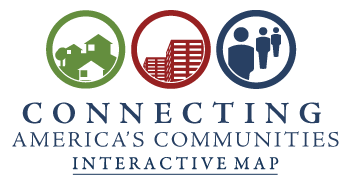BTOP in Action
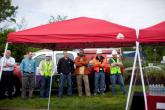
On May 23, 2011, Horizon Telcom began the construction phase of the Connecting Appalachia project with a kickoff event in Logan, Ohio. The event, which was held outside a healthcare facility that will receive improved service as a result of the project, started with construction workers installing a single utility pole to launch the building of a 1,960-mile broadband network.
As recently as late August, construction crews have added more than 100 miles of fiber-optic lines and connected 178 community anchor institutions to the network, including other medical facilities, schools, higher education institutions, industrial parks, county courthouses, and public safety coordination centers. This network currently extends over 13 counties, with plans to reach 34 counties once complete, and it is estimated to deliver middle-mile speeds of up to 10 Gbps.
The Connecting Appalachia project’s new network runs through an extremely rural, low-income region that includes areas with mostly dial-up Internet connections and many schools with no broadband access. Horizon plans to offer affordable Internet service to these communities, customizing services for anchor institutions that require different speeds, point-to-point service, and other options in hopes of connecting approximately 600 community anchor institutions.
BTOP funds also have allowed Horizon to engage four contracting firms, which have hired several hundred workers for construction crews. In addition, Horizon has hired more than a dozen people for various headquarters positions, including project administration and sales.
Last Updated: December 7, 2011
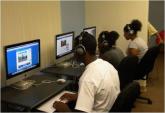
Since receiving BTOP funds, the Housing Authority of San Bernardino, in partnership with the Career Institute National Federation Center, has enrolled more than 70 participants in a 12-week workforce training program. The curriculum offers training in writing cover letters and resumes, conducting online job searches, and applying for employment. Targeted to public housing residents at five public computer centers in San Bernardino County, Calif., participants can also earn an online National Retail certification. This certification, developed by the National Retail Federation, demonstrates that an individual is credentialed in customer service, sales, and retail management.
In fall 2010, the Housing Authority also hosted 15 job training classes and seven job search/resume workshops at its computer centers.
BTOP funding has not only helped the Housing Authority hire nine new full-time staff, but has also helped 86 computer center users/trainees gain new jobs.
The Housing Authority also extended hours in computer labs across various community centers in the San Bernardino City Unified school district. Operated by the Top Flight Education and Sports Organization, the computer labs are open Monday through Thursday afternoon to assist more than 30 children each month with homework and other school-related projects.
Last Updated: October 17, 2011
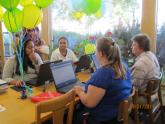
By late August 2011, the Idaho Commission for Libraries (ICfL) upgraded public computer centers at 26 libraries across the state. These refurbished centers are experiencing a renaissance with increased usage from new and long-time library members. Many of these patrons are using the centers’ new computers, online resources, and digital literacy coaches to learn new computer skills and help them find jobs.
BTOP funds have allowed ICfL to deploy more than 287 workstations, serving an average of 9,405 users per week. Along with these computers, ICfL is providing free access to a wide variety of online journals, reports, and databases. For example, ICfL provides a free subscription to LearningExpress Library (LEL), an interactive online tool that offers a comprehensive selection of career and academic resources for job preparation, career advancement, and academic success. Through a partnership with the Idaho Department of Education, the program also offers free access to Apangea Learning, an online, supplemental math instruction and tutoring program that provides students with instruction, math problems, and access to live certified teachers.
In addition, ICfL trained and deployed 20 Idaho Youth Corps in various libraries. Established by the Department of Labor, the Youth Corps program provides high school and college students the opportunity to gain practical, hands-on work experience through meaningful projects that will enhance their communities. ICfL contributed a portion of its BTOP funds to employ these students for the summer. Hired as Digital Literacy Coaches, these in-house trainers were responsible for helping patrons with computer basics and Internet fundamentals.
ICfL’s ultimate goal is to provide educational, employment, and e-government services to economically vulnerable populations in the state. To reach these groups, ICfL launched an innovative outreach campaign showcasing the benefits of broadband and its training courses. The program created six television and four radio public service announcements (PSAs) that highlight the libraries’ new resources and services. To view a collection of the project’s PSAs, please visit here.
Last Updated: December 7, 2011
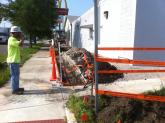
The Illinois Department of Central Management Services (CMS) recognized a need for increased broadband capacity in many of Illinois’ rural, economically distressed counties. To address this digital divide, CMS is building a 2,000-mile fiber network comprised of 1,000 miles of new fiber and 1,000 miles of upgraded existing fiber. The network will increase speeds to approximately 1GB for community anchor institutions (CAIs) and provide low-cost Internet service primarily in underserved areas in 55 counties across central Illinois. As of September 30, 2011, CMS had upgraded approximately 600 miles of existing fiber and created 83 jobs as part of the construction.
CMS already established and activated the first backbone link of the network, which is being used by existing customers. CMS expects to connect its first CAI in the first quarter of 2012. Once the network is complete, the project plans to connect nearly 400 CAIs, including approximately 100 K-12 schools, 20 libraries, 30 healthcare organizations, 30 public safety agencies, 100 state and local government agencies, and every community college in the service area.
CMS is part of the Illinois Broadband Opportunity Partnership that includes two BTOP recipients: DeKalb County Government and the Board of Trustees of the University of Illinois. The three organizations plan to interconnect their networks to advance the partnership’s goal of ensuring that all communities in the State have access to affordable and sustainable broadband services.
Last Updated: January 5, 2012
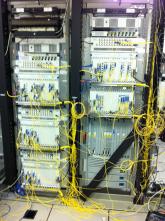
The Iowa Communications Network (ICN) project, known as Bridging the Digital Divide for Iowa’s Communities, will bring enhanced broadband capabilities and provide 10 Gbps-capable points of presence to all 99 of the state’s counties. As of June 2011, ICN has upgraded 210 miles of fiber and connected 301 anchor institutions. Ultimately, the project will enable speeds of 1 Gbps for community anchor institutions statewide for more than 50 libraries, 800 educational institutions, and 1,000 government facilities. ICN’s partnership with non-profit Iowa Health System, which is another BTOP recipient, will also allow for a comprehensive statewide fiber-optic network that serves public sector, private sector, and non-profit entities.
ICN will provide a robust broadband network that will run many bandwidth-intensive applications, such as transmitting hospital MRIs, video streaming, and web-based systems. ICN’s new broadband infrastructure will also provide high-speed Internet service to both the Sac & Fox Tribe of the Mississippi in Iowa and the Decorah MetroNet.
Last Updated: December 7, 2011
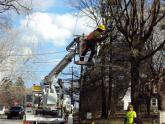
On March 28, 2011, a Keystone Initiative for Network Based Education and Research (KINBER) construction crew hung the first strand of fiber for the new 1,600-mile fiber network that will provide high-speed Internet access across Pennsylvania. With this new network, KINBER plans to connect over 60 education, research, healthcare, and economic development community anchor institutions.
KINBER, with the help of its contractor, Sunesys, deployed seven construction crews to string the fiber and stage networking hardware at community anchor institutions. The BTOP-funded project has created more than 50 construction jobs. Through October 2011, the crews had deployed 325 new miles and prepared the first 13 community anchor institutions for connection. Broadband service to these community anchor institutions across southern and central Pennsylvania will increase to speeds of 100 Mbps to 10 Gbps.
KINBER’s ultimate goal is to increase educational development in the 39 counties the network spans. Oftentimes, small public universities, especially in rural areas, are left behind because they do not have the necessary broadband capabilities or capacity. Access to this new high-speed network will allow these educational institutions to expand distance learning programs and work collaboratively with other research facilities. Additionally, KINBER plans to offer Internet services at affordable prices. KINBER expects that this affordable broadband network will supplement efforts to spur business growth in these small, rural communities.
Last updated: January 5, 2012
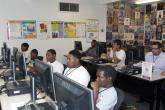
“Can you just imagine what your life would be like without technology?” On October 8, 2010, Las Vegas-Clark County Urban League (LVUL) Nevada Public Computer Centers (NPCC) program manager, Jeff Drothler, posed this question to participants at the Doolittle Community Center grand opening celebration. Visitors to the grand opening heard the story of Julia Mann, a Las Vegas woman who had been unemployed for two years and living in a shelter with her son. Now, after completing an NPCC computer course and working with one of the Center’s job advisors, she is employed. This is just one of the many success stories of residents in public housing developments, low-income, and high unemployment communities who have benefitted from the training, job search assistance, and computer classes provided at LVUL’s 30 public computer centers.
The 15 percent unemployment rate in Las Vegas is difficult on the community, especially those residents who lack computer skills. To improve digital literacy and help people find employment, NPCC offers computer classes and trains visitors to conduct online job searches and prepare resumes. LVUL sponsored a career fair where 100 attendees, primarily Spanish speaking, received guidance on interview preparation and spoke with potential employers. With the help of BTOP funds, NPCC hired 24 full-time and six part-time personnel as instructors and supervisors, and for IT support.
Currently, the 15 new and 14 refurbished computer centers serve 2,500 to 3,000 users per week. NPCC instructors and project partners provide Microsoft Office® training, basic Internet skills classes, and one-on-one help. Students working on class projects as well as senior citizens learning how to use technology to stay in contact with family come to the center for tailored assistance.
Last Updated: October 19, 2011
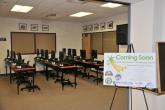
In the summer of 2011, the Lyon County School District opened four public computer centers to serve communities in western Nevada. These centers are part of an initiative to improve computer skills and economic opportunities among residents of Lyon and neighboring Mineral County. At each of these centers, high school students can conduct research to prepare for college, and community members can utilize the new computer resources to search for jobs.
In addition to computer and Internet access, the centers provide collaborative technology capabilities, including SMART Boards, document cameras, and videoconferencing equipment. This equipment offers the school district an opportunity to expand course offerings in small, remote high schools. For example, students at Smith Valley High School are utilizing their local computer center to take Spanish courses taught virtually by a teacher from another high school.
Lyon County is also hosting a wide variety of courses at these computer centers. For instance, the computer center in Fernley is offering a mix of workforce development, digital literacy, and higher educational classes, including resume assistance, healthy communities, and tax preparation. The tax preparation course, for example, provides low-income families with access to tax professionals who can help them prepare and e-file their tax returns. Through these classes, Lyon County community members are developing skills that they will be able to use to further their career goals.
Last Updated: December 23, 2011

Maine Fiber Company, Inc. announced the completion of the first Three Ring Binder lateral on October 8, 2010, a five-mile section of what will become a 1,100-mile rural high-speed Internet network. A ribbon-cutting ceremony made Mid Coast Hospital in Brunswick the first of hundreds of community anchor institutions expected to connect to the Three Ring Binder stretching from Fort Kent to Biddeford.
Maine Fiber is building out the network in several additional locations as rapidly as possible with plans to work throughout the winter. The pole attachment phase alone will employ small, family-owned and large incumbent detailers, contractors to perform make-ready work, eight crews of construction workers, and professional services. A large effort like this could mean jobs that forestall layoffs and add overtime hours.
Three Ring Binder is a good example of how public and private funding came together to connect the state to broadband services. BTOP funding will help build a middle mile connection to the large Internet hubs or nodes in Portland. Private money will support the laterals off the network needed to reach anchor institutions, including the state’s university and community college campuses, government offices, police stations, and economic development and training facilities.
Mid Coast Hospital illustrates how broadband access will benefit Maine. Beginning November 1, neurologists at Maine Medical Center in Portland will be able to treat Brunswick-area stroke patients via the Internet. High-speed Internet service enables the transmission of large data files such as CT scans. At the same time, patient information is protected over secure networks.
To see additional local media coverage of the project, please visit Maine Public Broadcasting, WCSH6, and Mainebiz Fiber Driver. To get an update on the project, watch Mainebiz Sunday’s The Business of Broadband Part 1 and Part 2.
Last Updated: October 17, 2011
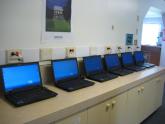
Maine State Library is demonstrating that public computer centers are sources of opportunity for state residents, particularly in a weak economy. The state has experienced its highest increase in unemployment in recent years among residents with the least education, and many job seekers do not have the experience or educational prerequisites to enter occupations with the largest share of openings. To help address some of these challenges, Maine State Library’s Information Commons Project is providing free broadband access, career development tools, and job search resources.
As of December 2011, the Information Commons Project delivered 565 new workstations to computer centers at 107 public libraries statewide. The project also established 11 video-conferencing regional hubs and three mobile computer labs to enable training for librarians and patrons in remote areas. Along with these new computer resources, the project created a web portal that brings together resources to help visitors learn new skills and get jobs. The portal, which can be accessed from home or at a public library, offers more than 80 free career and digital literacy courses, webinars, and resources. Additionally, the portal offers free access to the LearningExpress Library, a platform featuring more than 770 practice tests, tutorials, and e-books on job searches, workplace skills enhancement, GED exam preparation, certification and licensing exam preparation, and college and graduate school admissions exam preparation. The LearningExpress Library includes popular video-based tutorials on Microsoft® Office, Adobe® products, and other software used in the workplace today.
Maine State Library also provides on-site training for job seekers, in partnership with the Maine Department of Labor’s Rapid Response Team. For example, on Dec. 14, 2011, McArthur Public Library in Biddeford hosted a training session for unemployed workers, including a group laid off by a local branch of a home improvement chain. The session gave an overview of the online resources available to job seekers, and covered topics such as interviewing skills, preparing for job fairs, and the use of social media during job searches. More sessions in libraries statewide are scheduled as the Maine State Library works with career centers, workforce investment boards, and public libraries to help residents develop practical skills to rejoin the workforce.
Last updated: January 10, 2012









